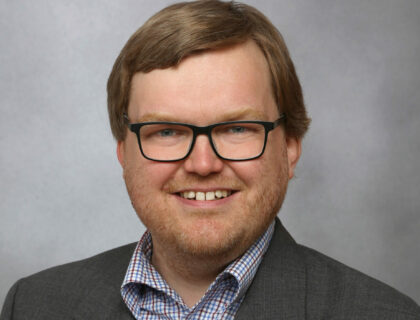Sociolinguist receives Heisenberg funding worth over half a million euros

Time traveling with historical letters
Thomas Mann was not particularly keen on using the new spelling rules of his time – who would have thought that of one of the major authors of the 20th century? This is just one of the findings of the new research project of Dr. Markus Schiegg, Privatdozent at the Chair of German Linguistics. Schiegg investigates how the language of people living around 1900 changed over the course of their lives. The researcher has now received funding for his project as part of the renowned Heisenberg funding program of the German Research Foundation (DFG).
Just as is the case today, in the 19th and early 20th century there were discussions about how certain words ought to be written correctly. A major turning point was marked by the Orthographic Conference in 1901, and the publication of the Duden a short time later. But how did people react to this event?
That is one of the topics PD Dr. Markus Schiegg from the Chair of German Linguistics at FAU is investigating in his project. He dives into the past, analyzes notes, diaries and letters from people living around 1900.
How we write reveals what we are like
He looks at people from different social classes: from the simple shoemaker or maid servant to well-known authors and scholars. Schiegg pinpoints specific language variations, such as the spelling of individual words, before comparing them with each other. This in turn allows him to draw conclusions about the lives of the people and how consistent they were in their use of language.
“Before 1901, the German word for door ‘Tür’ was usually still written with a ‘th’. That was no longer officially the case after the spelling reform,” explains Schiegg. “Using the archived texts, I can analyze whether the new spelling was adopted, and if so, then how quickly.” In doing so, he not only reconstructs how people’s language changes, but also receives insights into the lives and social contexts of people from different social groups.

Surprising: Thomas Mann was not particularly open to the new spelling rules, indeed he seems to have deliberately rebelled against them at first. This is the conclusion Schiegg reached after reading several letters and notebooks written by the author. “Thomas Mann took two decades before he started to use the new spelling conventions in his written language. Some simple people were quicker,” Schiegg says. “Even though they may have been less educated, they were able to adjust their language accordingly in public writing, guided for example by the language used in newspapers.”
Simple people, fewer sources
One of the major challenges, however, is the fact that while there are more than 20,000 archived and as yet largely unanalyzed documents from scholars of the period in the Erlangen University Library alone, there is a conspicuous lack of documents from people in other social classes. “Letters from simple people are only archived in exceptional cases,” explains Schiegg.
For this reason, he has already created a linguistic corpus of over 4,000 letters from people living in psychiatric institutes for a previous project. Letters from patients were often not posted, but rather retained by doctors at the institutes. They now form the foundation for Schiegg’s new project.
Another source are letters from emigrants. “Many people emigrated to America in the 19th century for economic reasons. It is particularly fascinating to see how their language changed as they built up a new existence for themselves in a different language context,” explains Schiegg.
Heisenberg funding
With this program, the DFG funds outstanding researchers on their way towards a permanent professorship. Schiegg’s project on the “Instability of individual language usage” has received funding of over 500,000 euros for a total of five years. Acceptance onto the Heisenberg program has taken Schiegg a major step closer to his goal of gaining a professorship.
The position has received initial funding of just under 320,000 euros for three years. In addition, there is the prospect of an extension and continued funding amounting to approximately 215,000 euros. The funding will be used predominantly for human resources, materials and traveling to important conferences.
Further information
PD Dr. Markus Schiegg
Chair of German Linguistics
Markus.schiegg@fau.de
germanistik.phil.fau.de/person/dr-markus-schiegg/